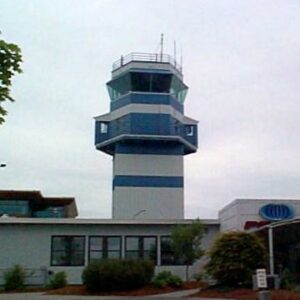Residents opposed to the construction of a new airplane operating facility at Pease International Tradeport say their concerns about the environmental impacts are going unheard. But the facilities executive director is not backing down from his support for the controversial project.
“The narrative that is out in the community that potentially this is being rubber-stamped or rushed is the farthest thing from the truth,” Pease Development Authority (PDA) executive director Paul Brean told the Portsmouth Herald. “Obviously people hear wetlands, people hear this (jet fuel) could get into the wetlands, it’s simply not the case,” Brean said. “There are safeguards in place that we will carefully handle this product and we have faith in the design plans.”
But while Brean may have faith in Million Air and its plan, many in the community do not.
“This is more than unfair; this is irresponsible to move forward on a plan that hasn’t even answered some of the basic questions about environmental impact,” Newington resident Meghann Wayss said. “I don’t understand why they would ignore the questions and concerns.”
As NHJournal has previously reported, eight Granite State lawmakers wrote a letter to the PDA voicing their concerns about the project. “Government studies confirm these wetlands already contain PFAS contamination,” wrote state Sen. Deborah Altschiller (D-Stratham). “Building on and next to these wetlands risks putting contaminants back into circulation.”
And the Houston, Texas-based company is also currently facing resistance to a proposed facility at the Westchester Airport in White Plains, N.Y.
But despite a steady stream of complaints from the Portsmouth community, the Million Air project appears to be gaining altitude, thanks in part to Brean’s outspoken support. And last week the Pease Development Board’s Technical Review Committee unanimously approved plans for its proposed fixed-base operator facility, which would include a new hangar as well as a fuel farm that would hold close to 90,000 gallons of jet fuel.
The potential for a jet fuel or plane deicer leak into the nearby wetlands has residents already dealing with PFAS contamination worried the project is moving too fast.
Company spokesman Peter Bragdon said Million Air is listening to residents who are worried about the project.
“In the two-plus years since Million Air’s project was first proposed, it has been formally discussed at 10 public meetings of the PDA Board, the Department of Environmental Services, and the TRC, with public comments presented at most of these meetings,” Bragdon said. “Million Air factored in all comments from the public, as well as those from committee members, into their revised plans and was pleased to receive a 7-0 approval vote from the TRC.”
If Million Air is listening, as Bragdon suggested, company executives know nearly one thousand residents have signed a letter asking the project to move to a location away from the wetlands. So far, the company has not indicated it plans to change its location.
Seacoast area residents have been dealing with PFAS contamination in their drinking water as a result of decades of air operations at Pease, which was once a United States Air Force base. The prospect of a Million Air setting up its FBO close to the wetlands that feed into that same drinking water has many on edge.
“People are still paying the price for PFAS contamination,” said state Rep. Jackie Pitts (D-Portsmouth). “You must take this into consideration. Mistakes of the past are about to be made again.”
Bragdon said Million Air’s FBO will feature state-of-the-art protections, and that it will be smaller than Port City Air’s fuel and fluid system currently in use at Pease.
“(It) will include double-walled storage tanks and piping, retention berms, oil stop valves, oversized containment chambers, and oil-water separators, backed up with failsafe alarms, control valves, and high-level gauging instrumentation,” Bragdon said. “It will be far more environmentally safer than Port City Air’s two existing fuel farms, one of which abuts Million Air’s proposed fuel facility, which together stores and distribute more than 300,000 gallons of fuel and deicing fluids at Pease.”
Brean echoed Million Air’s position to the Herald saying, “It’s going to be one of the most state-of-the-art fuel farms in the region, if not in the country. Our design for this goes above and beyond any of our local and federal regulations.”
But for residents like Dania Seiglie, the approval process is ignoring issues like the potential loss of vital wetlands areas because of Million Air’s construction, or the lack of soil sampling being done at the site.
“I’m furious that none of these environmental concerns, not one of them, was considered by this Pease Technical Review Committee,” local activist Dania Seiglie said.
Bragdon would not answer directly when asked if the company plans to meet with residents about the project in order to address their concerns. Seiglie said Million Air’s FBO proposal has been rushed through the review and planning process over the wishes of the resident who will have to bear the burden if there is any environmental fallout.
“I’d like to know why this vote was rushed when they had three more months to review the details and get answers that were being respectfully and consistently asked by the public. I have been asking these questions for months and I still don’t have any answers,” Seiglie said.




